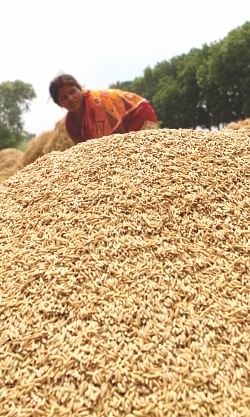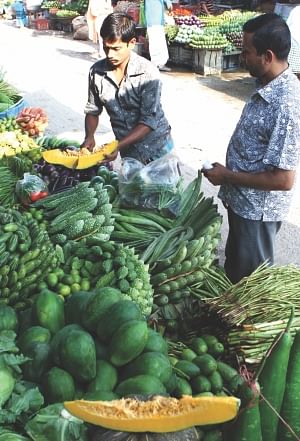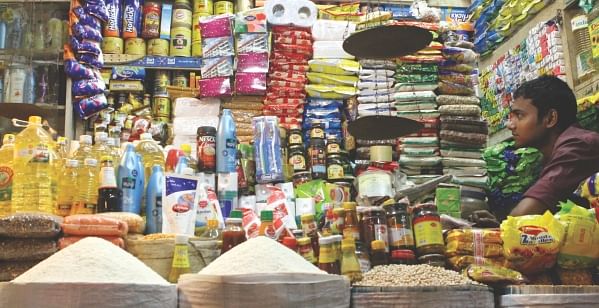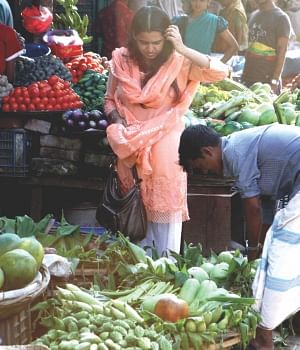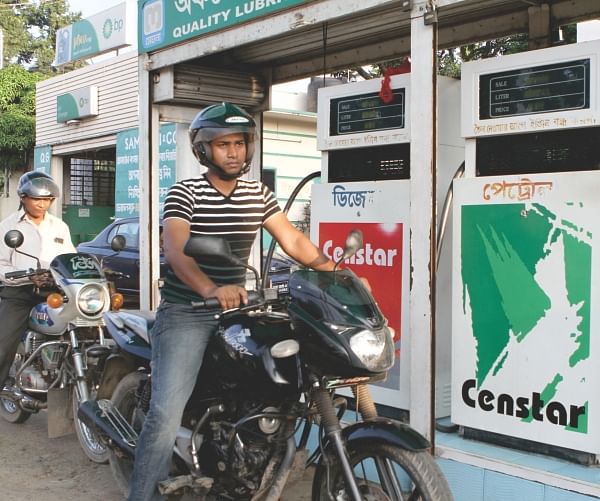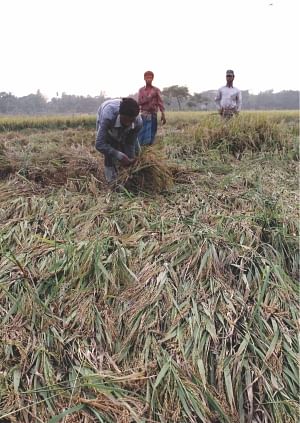| Home - Back Issues - The Team - Contact Us |
 |
| Volume 10 |Issue 37 | September 30, 2011 | |
|
|
Cover Story Less Food on the Table? During the last Ramadan, 36-year-old Shahana was at her wit's end trying to cope with the rise in food prices which is customary during the holy season. The only way she could keep her expenses within her means was by cutting down on the number of iftar items. For a middle class housewife like her, the struggle for survival in a free market economy remains the same round the year. This year, she says, buying food for her family has been an even greater challenge. Farhana Urmee Photos: Zahedul I Khan
With the advent of Ramadan price of certain commodities such as sugar, dry fruits, lentil and cooking oil witness a sharp rise in the market in response to the overwhelming demand for these items. Things are not any easier the rest of the year. Shahana feels frustrated and helpless every time she goes to a kitchen market or a grocery shop: food is becoming just too expensive. Many reasons are given by retailers, wholesalers and politicians to justify the rise in food prices. Whether it is the general price hike in the international market, high production cost, or even the wrath of monsoon damaging grains and vegetables, the inevitable outcome is the sky rocketing prices of food. A study carried out by Oxfam GB, Bangladesh has mentioned that after the Fiscal Year 2007-08 the price levels of almost all the necessary food items have gone higher till 2011. The first half of the current year has seen the higher prices of rice, wheat, edible oil and lentil. The study says that April 2011 has experienced the highest record of food inflation in the history of Bangladesh which is 14.36 percent. Alarmingly, the study reveals, food inflation in rural areas of the country has remained higher than that of the urban areas since the month of March this year. Shahana tries to adjust to the rise in food prices by being imaginative when preparing daily meals. She adds some mashed sweet potato in cooked pulses to make it thicker so that a less amount of pulses (which is costlier than the potatoes) is required. “I need 500 grams of lentil daily for four of my family members. But I cannot pay Tk 60 daily for only 500g pulses. At the same time I cannot ignore its necessity in my daily menu, so I have to think smart”, says Shahana. Afsana Zaman, an English medium school teacher, has almost cut out vegetables from the daily diet altogether, due to the inordinate rise in their prices. She adds, “A single brinjal for Tk 85, made me crazy while I was shopping at the kitchen market in my neighbourhood in Bashundhara. Although I draw quite a decent salary I cannot afford to buy vegetables at such a high price as I have to pay my bills and other utility charges. As a result I have given up on most vegetables altogether and just sticking to the basic items like meat, potato and rice. Isn't it the wise thing to do in this situation?”
MM Akash, noted Economist and Professor of Economics Department, Dhaka University comments on the theoretical reasons of price hike. “To cut something a scissor needs two blades and to raise the price of necessities (like food) there are two factors working in the process. Supply and demand, the correlation of these two factors is responsible for the spike and drop of price of food and other necessities”. In our country price increases due to two general reasons. If the cost of production is increased somehow due to natural (eg floods) or manmade (like increase in fuel costs) causes that automatically influence the price of the final product. Again, the price of the imported food items is related to stability of the international market, MM Akash thinks. “If the international market experiences a sudden spike in price, the price of that particular food item rises in the local market. These are all the natural causes of price hike of food and grains. But unfortunately our market is not remaining confined to responding to these rational reasons of price hike,” MM Akash adds.
Referring to multiple sources, the Oxfam study has analysed the changes in the prices of edible oil, sugar and pulses. According to a 2011 report of Trading Corporation of Bangladesh (TCB) the price of soybean oil has increased by 42.86 per cent and over the last one year the price of palm oil has increased by 33 percent. Again, prices of chola, anchor dal and mung dal have increased by 64.71percent, 48.21 percent and four percent over the same period. Interestingly, according to the World Bank Pink Sheet, 2011, the price of palm oil has increased by about 20 per cent, soybean oil by about 33 per cent in the international market in the last one year. The sugar prices in the US and EC market have increased by 14 and eight percent in the same period of time. “The price of these food items are still increasing and may continue in the near future if the state fails to intervene in a constructive manner,” says the Oxfam study. MM Akash also observes that there are other factors working effectively to raise the price of food so frequently. A monopolised market, unwanted hoarding of grains and food with the intention to sell them at higher prices later, the presence of multiple middle-men between farmer and retail consumer and the culture of extortion in different phases from production to sales are some of the external reasons of food price hike. These external reasons of price hike can be regulated and controlled by the government, says MM Akash. Open Market Sales (OMS) has an important role to play in this factor. Because of the function of OMS poor people still can buy rice. But consumers belonging to middle income groups face a great deal of constraint trying to adjust to the cost of living (especially in terms of managing daily menu). But selling rice and wheat or cooking oil through OMS often does not prove to be good enough to help the poor to afford fish, meat or vegetables with high prices. As a result most of the poor are living on carbohydrate intake only. Day labourers like Salma cannot afford beef or mutton because of their high prices. She can hardly remember the time other than Eid-ul-Azha when she and her family have eaten meat. "If the government faces a situation in which there is no way out but increase food price, the revision of wage commission for service holder in every five years should take food inflation into consideration,” MM Akash adds. But it has also been observed that a revision of wage scale declaration might not help the middle class government service holders, as, right after the declaration, food price increases in the local market through a syndicate of businessmen. MM Akash thinks that the TCB can play an important role in controlling the price of imported food items. It can hoard food before the price spike in the international market and sell them accordingly in the local market and thus control food inflation. It is not enough to have such an organisation working in a limited context. The government has to have the will to let it function properly. Strengthening the TCB can play a vital role in regulating food market, says the economist. The TCB has to be provided with the necessary manpower, flexibility to work, scope of decentralisation, adequate networking and required budgetary allocation. Only then can it be expected to function properly and help the local market in regulating the price of food, observes MM Akash.
Barun Deb Mitra, acting secretary, Food Division, ministry of Food and Disaster Management also says that food price increases depend on the result of the reciprocal action of supply and demand of food. “Yes, production of food grains and vegetables has increased after the independence of the country. Yet, a strong factor like increasing population influencing the demand and supply and leaving us with the need to import food of the kind that we can not produce a plenty.” In spite of having two consecutive bumper harvest of rice and almost satisfactory harvest of wheat, around 5.4 million metric tones of food grains were imported in the FY 2010-11. This is said to be an astonishing record in the amount of food import in the history of Bangladesh. According to the statistics provided by Bangladesh Bureau of Statistics (BBS) and Department of Agricultural Extension (DAE) the country's food production has increased quite dramatically over the last four decades. It had produced 187.2 thousand metric tons of wheat, maize, barley and other cereals in the year 1971-72. The production of grains reached to 1015 thousand metric tons in the year 1981-82. In the year 1991-92 the production was 1145 thousand metric tons, in 2001-02 it was 1694 thousand metric tons. The production of spices, potato and vegetables has also experienced a rising trend in the same period of time. The total vegetable production, of different seasons throughout the year was 705 thousand metric tons in 1971-72, 864 thousand metric tons in 1981-82, 1100 thousand metric tones in 1991-92 and 1599 thousand metric tones in the year 2001-02. The Oxfam study also questions the contradiction of increasing production and the demand of import and frequent price hike in the food market. The study suggests: “Bangladesh should have achieved food self-sufficiency since 2005-06. Despite that the country still needs to depend critically on food imports”.
“The statistics we get from the Planning Ministry on the production of food grains often does not represent reality. Moreover, we have a number of old standards to measure our demand for food. After independence, for instance, we had a certain estimate of number of kilo-calories needed by a person each day. Over time, lifestyles have changed and with them the number of calories consumed. Revolution in the production of food grain has made more rice available than before (pre-independence period) and some other factors have also contributed in the regular need of calorie intake. This need for calorie intake determines the demand of food. Again, it is not only the supply of food that makes the price rise or drop”, observes Mitra. Our ministry is going to conduct a study in this regard which might help us measure the demand for food, adds Mitra. Regarding the OMS, Mitra says that the government is trying to solve the problem of food inflation by this system, yet lack of resources often constrains government's will and initiative. If internal resource mobilisation (such as revenue from taxes) could be ensured, it could have been possible for the government to tackle the food market at least by selling rice and wheat for the poor at lower prices, Mitra adds. Beside expanding the production of food grains and importing other items, the right to food of people can be preserved by making their prices stable in the market. Because of frequent food price hikes, people are forced to ignore their need for a balanced diet and consume as less as they can to adjust their expenses. The study says that the prices of food grains started to increase abnormally in Bangladesh from the beginning of 2008 and reached an unprecedented level. Despite prices of rice and wheat coming down to affordable levels, since the latter half of 2008 and continuing until 2009, from the late 2010, prices of necessary food commodities once again started to climb up to untenable levels. The study also puts light into some loopholes in the failure of the mechanism of the government's effort to keep the food market in control and within the reach of the middle class and poor people. If a 'separate price monitoring cell' could be formed by the government, it would be easy for the Ministry of Commerce to monitor the market thoroughly. Again, it is a must to measure the demand of food to ensure its supply in the market as the country does not have a proper demand forecasting system for most of the food items except rice. A wing in the government to adjust the international and local price is a must to curb the unusual price hikes of imported food items. In a country where people spend around seventy percent of their earnings buying food only and the government plays an inactive role to ensure food at affordable prices for all, people like Shahana, Afsana or Salma find the suggestion of the Commerce Minister's 'to eat less' as the only viable solution to tackle the raging food prices.
Fuelling Inflation The recent government rush to hike fuel prices to cut the subsidy will badly affect the consumers who are already reeling under inflationary pressures Rifat Munim Photos: Zahedul I Khan The political crises in the Arab region had given the world a heads-up several months ago, that international fuel prices would continue to show an upward trend. Referring to the social and political unrest in some of the Middle Eastern and African countries, especially to Libya, the IMF in its World Economic Outlook (April 2011) had warned of a 60 percent increase in oil prices within a year and almost 90 percent within 5 years due to a reduced growth. However, peaking above $115 a barrel in April, now the price stands at $100 a barrel, give or take. Although the hike is less than the projected amount, it is enough to make either the government or consumers pay a heavy price across the world.
Such a scenario became obvious as early as March. But the Bangladeshi government had some broader visions in mind. While the whole world was busy chalking out newer ways to mitigate the impact of the fuel price hike, it opened two private and one public rental power plants in its bid to address the power crisis. Naturally, oil import increased substantially as the plants were diesel and furnace oil-based. Curiously enough, the government was too short-sighted to see through the imminent crisis as it announced the highly ambitious budget for the fiscal year 2011-2012 with a deficit of Tk 45,204 crore. Inevitably, the government was later faced with only two choices: either allocate more subsidy which is already saddled with an annual amount of Tk 14,500 crore; or hike up the oil price in the local market to take it on the consumers already reeling under inflation. Quite predictably, it has opted for the latter, hiking the fuel price for a second time in four months, which came into effect on September 18. In line with the new rates, prices of diesel, octane, petrol and kerosene jumped by five taka a litre and furnace oil by eight taka a litre. CNG prices and bus fares were also increased accordingly. This untimely decision caused by the government's myopic vision will further increase inflation which, according to data released by Bangladesh Bureau of Statistics, has already risen 0.33 percentage points to 11.29 percent in August, compared to a month earlier, mainly due to a rise in prices of non-food items. MM Akash, professor of Economics at the University of Dhaka, says, “Inflation will definitely increase because we've so many production sectors that are based on fuel. First comes electricity; then agricultural products because irrigation these days is completely dependent on either power-run or fuel-run pumps. The inflated electricity price in its turn will have a domino effect on a whole gamut of industries including the garment industry. Furthermore, food prices are closely connected to transport costs, so that will rise too.”
Zaid Bakht, research director of Bangladesh Institute of Development Studies, has said that considering the international market and the government's highly ambitious budget, the fuel price hike was hardly unexpected. He however opines, that the rush with which the hike was dealt with could well have been avoided. “To me this decision wasn't an unexpected one. When this year's budget was announced, which was a very big budget with a huge deficit and very little subsidy, it was understood that energy prices would be adjusted despite the growth in revenue collection,” he says. Akash thinks that the government's imprudence is responsible for the untimely fuel price hike because a rise in international oil price was all too predictable and that this scenario has been compounded with the depreciating value of taka against the US dollar for quite a long time, which also multiplies the import cost. He says, “The government has yet to learn that one should cut his coat according to his cloth. It intended to impress people by opening the rental power plants, which now has started to backfire. Although the plants will generate more power, it now necessitates more oil import escalating the cost well above the government's expending capacity. I believe a far-sighted approach to the whole issue could have contained the fuel price hike and thus saved us from another inflationary blow.” About the pre-emptive measures, he adds, “There were two ways to avoid this situation. One was by increasing direct tax and the other was by investing on the already explored gas fields so that Bapex, after extracting gas from the fields, could divert it to power generation. In that case, cost of energy and amount of subsidy could have been reduced. However, the government opted for none.” Apart from the power plants and increased price in international oil market, Bakht identifies some other factors that have contributed to the situation. The funding for fiscal deficit comes from foreign aid and domestic sources such as bank loans. However, the government was frustrated in both cases. He explains, “In case of foreign aid, the conditions imposed are more stringent than before. For example, the donors are now more particular about procurement rules, which is why there was no expected result. Then the most viable fallback option is to take loans from local commercial banks. This option is also not without problems. In spite of subsidy cuts in agriculture and import sectors, this year's target for seeking bank loan is about Tk 19,000 crore, which is higher than the previous year when there were more subsidies. So this target is very high and when such an amount will be borrowed, the banks will surely face severe liquidity crunches.”
To make matters worse, in the first two months of the current fiscal year the government has already borrowed over Tk 7,000 crore, already creating a liquidity crisis. At the same time, remittance earning has significantly dropped due to political unrest in Libya and the Middle Eastern countries, which will create a lot of pressure on the balance of payments. Bakht notes, “Along with a fall in remittance-earning, all the big projects to be funded with the foreign aid are in a limbo. I think the government can very clearly see that it is going to get into a tight balance of payment situation, may be the foreign reserve will also shrink, that's why it is now desperately seeking $1billion dollar loan from IMF and World Bank each.” In the face of such uncontrollable inflationary rates, MM Akash thinks that the lower and middle income groups will be the worst victims. “In our country there is no proper monitoring. So when price of one thing is hiked, prices of other things related to it increase disproportionately because the middlemen always grab the chance of poor monitoring. So in addition to a yet-to-be-controlled inflation, there will be a chaotic situation in both food and non-food markets if the government fails to enforce strong monitoring,” he says. As the international oil market is still volatile and prices may go up further, chances are oil prices in the local market will shoot up again. In the face of such volatility and the government's widening fiscal deficit, there are still some steps that can be taken to cushion any further impact of international market. Akash suggests, “When you seek loan to an organisation like IMF, you'll have to bow down to some conditions such as subsidy cuts. So the government has to mobilise its domestic resources in order to attain self-sufficiency. Instead of giving all the money to the multi-national companies, it has to invest on the local resources e.g. Bapex. In addition, the government should impose direct tax on property, especially on windfall gain that certain powerful people gained by manipulating the share market. If it is done, then it will not affect common people but the government will get a lot of money to use as cushioning against subsidy cuts and taking foreign loans.”
Copyright (R) thedailystar.net 2011 |
||||||||||||||||
